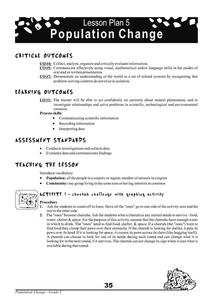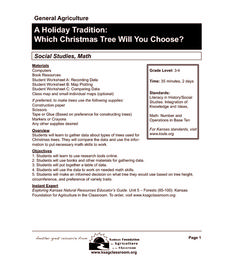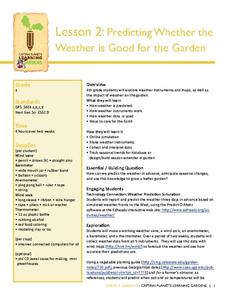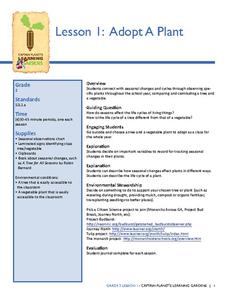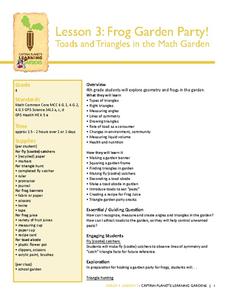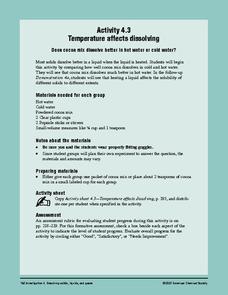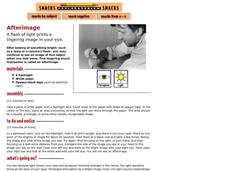North Clackamas Schools
Sorting Living and Nonliving Objects
Is a rock living? How about lima beans? You'll find everything you need for an interactive sorting activity exploring living and non-living things.
Cheetah Outreach
Population Change
Your youngsters become cheetahs in search of food, water, shelter, and space in a fun physical game that does a fantastic job of representing fluctuating species population based on resources available over years.
Agriculture in the Classroom
A Holiday Tradition: Which Christmas Tree Will You Choose?
Different varieties of Christmas trees provide an interesting way to combine social studies, science, math, and technology. Class members not only research the history of the Christmas tree holiday tradition, they compare and contrast...
Sea World
Shark!
Is that a shark? Here's a 10-lesson unit that will have learners expanding their definition of what a shark actually is as they examine different features, habitats, and diets. They explore endangered species, using information cards...
SeaWorld
How Big is a Blue?
Whales are all big, but some are larger than others! Kids will love sorting the 10 whale species by size at their desk (whale cut-outs provided). Next, use a whale rope to visualize how long each of these whales actually is. A large...
Forest Foundation
Forests, Carbon & Our Climate
To conclude their examination of forest ecosystems, class members consider the role forests play in the carbon cycle and how forests can offset climate change.
Captain Planet Foundation
Predicting Whether the Weather is Good for the Garden
Can your class predict the weather? Show them how they can come close with a lesson about creating weather instruments, including weather vanes, barometers, wind socks, anemometers, and thermometers. Kids research weather patterns and...
Captain Planet Foundation
Help a Sister Out: Garden Companions
Explore Native American gardening traditions with a lesson plan on companion planting. Based on the concept that certain crops grow better when planted near other specific crops, kids research the gardening method with background links...
Captain Planet Foundation
Adopt-A-Plant
Note the way that plants change during the season by adopting a plant on your school campus. After your class chooses their plant, they research the plant's needs, how it differs from other plants, find ways to support their plant's...
Captain Planet Foundation
Frog Garden Party! Toads and Triangles in the Math Garden
It's frog party time! With frog banners, frog juice, and a triangle hunt, your garden party is sure to be both entertaining and educational. The lesson plan connects geometry, earth science, and delicious snacks to teach kids about...
Captain Planet Foundation
Energy Flow in the Garden
How can you tell what an owl has eaten? Study the food chain and flow of energy in an ecosystem by dissecting an owl pellet and noting the bones found inside. Additionally, the instructional activity includes a game about consumers and...
Captain Planet Foundation
Worm Your Way Out of This
How can you provide healthy soil for your garden? Study worms, bacteria, and other microorganisms in a lesson about decomposition and organic compost. After discussing what you know about worms and watching a video, watch what worms do...
Captain Planet Foundation
Solar Cooking Race
Study heat transfer with activities that focus on how heat energy works. Using a solar cooker, ice cubes, and heat transfer bracelets, kids experiment and record what they find by keeping ice cubes cold and vegetables hot.
Captain Planet Foundation
Shape Shifters in the Math Garden
Combines mathematical measurement with gardening skills. Third graders hunt for worms in the garden and try to find the longest one. They also measure and weigh vegetables that they harvest from the garden, measure rainfall amounts, and...
Captain Planet Foundation
Rotting Away
What happens at the end of a plant's life cycle? Show kids the natural way that plants show that they're decomposing, as well as the importance of compost, with a lesson about living organisms. After reading Log Cabin by Anne Schreiber,...
American Chemical Society
Temperature Affects Dissolving
Stir chocolate drink mix into hot and cold water to see if there is a difference in how quickly it dissolves. Number three in a six-instructional activity unit on dissolving, this installment investigates the effect of temperature. If...
Exploratorium
Disappearing Act
Crafty critters are camouflaged to escape predators, and crafty science pupils can construct a camouflage demonstration. They work with a partner to show that as a camouflaged animal moves, it becomes more visible.
Exploratorium
Pupil
Give pupils a magnifier, a mirror, and a flashlight so that they can examine their own pupils. As they shine a light on their eyes, the light is shone on how this structure dilates and contracts to control how much is allowed into the...
Exploratorium
Afterimage
To illuminate how afterimage occurs, create a star, square, or other geometric-shaped light for learners to look at for 30 seconds. Then, have them explain what they see as they shift their focus to a blank wall. A full explanation of...
Staten Island Zoo
The African Savanna
Are you thinking about taking your class to the local zoo? Kids of all ages love visiting exotic animals in order to learn about biodiversity, habitat, and animal adaptations. Here is a 44-page activity guide that provides educators with...
SeaWorld
Animal Migrations
Here is a fabulous set of activities for your young scientists. Each instructional activity contains map, hands-on, and game activities that will help the class understand why and how animals migrate from one place to another. First...
Curated OER
Ladybugs, Ladybugs, Ladybugs
Those lovely ladybugs are so cute, and so very useful! Use a short unit to explore insect anatomy, the ladybug life cycle, and the help ladybugs provide organic farmers. The unit is comprised of four short thirty-minute lesson plans that...
Curated OER
My Insect Report
Is your class writing a report on insects? If they are, you have to check out this great set of worksheets. It provides a well-scaffolded system they can use to organize their research findings in order to compose a well-structured...
Scholastic
Study Jams! Arthropods
No need to be crabby! Here is a resource that teaches your class about the characteristics of arthropods and provides stunning photos of several of them. In addition to the superb slides and their informative accompanying captions, the...



